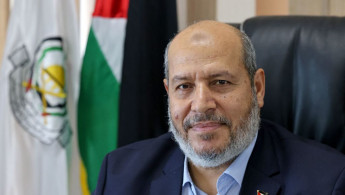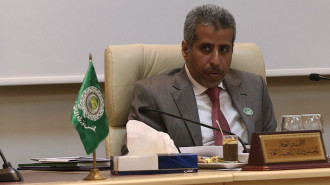Breadcrumb
Hamas official says group ready to disarm after two-state solution
A top Hamas official has told The Associated Press that the Palestinian group is open to agreeing to a truce of five years or more with Israel and that it would lay down its weapons and convert into a political party if an independent Palestinian state is established along pre-1967 borders.
The comments by Khalil al-Hayya, a high-ranking Hamas official who has represented the Palestinian group in negotiations for a ceasefire and captive exchange, in an interview on Wednesday came amid a stalemate in months of ceasefire talks.
It is unlikely that Israel would consider such a scenario as its far-right administration is adamantly opposed to the creation of a Palestinian state on 1967 internationally recognised borders, as it continues settlement building on occupied Palestinian territories.
Speaking to the AP in Istanbul, Al-Hayya said Hamas wants to join the Palestine Liberation Organisation, headed by the rival Fatah faction, to form a unified government for Gaza and the West Bank.
He said Hamas would accept "a fully sovereign Palestinian state in the West Bank and Gaza Strip and the return of Palestinian refugees in accordance with the international resolutions", along Israel’s pre-1967 borders.
If that happens, he said, the group's military wing would dissolve.
"All the experiences of people who fought against occupiers, when they became independent and obtained their rights and their state, what have these forces done? They have turned into political parties and their defending fighting forces have turned into the national army," he said.
Al-Hayya did not say whether his apparent embrace of a two-state solution would amount to an end to the Palestinian conflict with Israel.
The UN Security Council has long endorsed a vision of two states living side by side within secure and recognised borders. Palestinians seek a state in the occupied West Bank, East Jerusalem and the Gaza Strip, all territories captured by Israel in 1967.
While the international community overwhelmingly supports such a two-state solution, Israeli Prime Minister Benjamin Netanyahu’s hard-line government rejects it.
The war in Gaza has dragged on for nearly seven months and ceasefire negotiations have stalled.
The war began with the 7 October attack on southern Israel in which Hamas-led fighters allegedly killed about 1,200 people - according to Israeli officials.
The fighters captured some 250 hostages and returned with them to the enclave in a bid to push Israel to a prisoner exchange deal.
As of April 2024, Israel holds at least 9,500 Palestinian detainees in its jails - with over 3,660 in administrative detention - without charge or trial. Some 200 Palestinian detainees are children under the age of 16, while 80 prisoners are women, according to rights group Addameer.
Meanwhile, Israel's war on the Gaza Strip, which began on 7 October, has killed over 34,000 people - over 70 percent of whom are women and children.
The indiscriminate military offensive - which the International Court of Justice (ICJ) said could amount to genocide, has displaced over 80 percent of the enclave's 2.3 million population.
Israel is now preparing for an offensive in the southern city of Rafah, where more than one million Palestinians have fled to after Israel initially designated the area as a "safe zone".
Al-Hayya said such a Rafah offensive would not succeed in destroying Hamas.
He said contacts between the political leadership outside and military leadership inside Gaza were "uninterrupted" by the war and "contacts, decisions and directions are made in consultation" between the two groups.
Israeli forces "have not destroyed more than 20% of (Hamas’) capabilities, neither human nor in the field," he told AP. "If they can’t finish (Hamas) off, what is the solution? The solution is to go to consensus."
In November, a weeklong ceasefire saw the release of more than 100 captives in exchange for thousands of women and children Palestinian prisoners held in Israel.
But talks for a longer-term truce and release of the remaining hostages are now frozen, with each side accusing the other of intransigence.
Al-Hayya said that Hamas had made concessions regarding the number of Palestinian prisoners it wants to be released in exchange for the remaining Israeli hostages. He said the group does not know exactly how many hostages remain in Gaza and are still alive.
But he said Hamas would not back down from its demands for a permanent ceasefire and full withdrawal of Israeli troops, both of which Israel has baulked at.
"If we are not assured the war will end, why would I hand over the prisoners?" the Hamas leader said of the remaining hostages.
Al-Hayya also implicitly threatened that Hamas would attack Israeli or other forces who might be stationed around a floating pier the US is scrambling to build along Gaza's coastline to deliver aid by sea.
"We categorically reject any non-Palestinian presence in Gaza, whether at sea or on land, and we will deal with any military force present in these places, Israeli or otherwise … as an occupying power," he said.
Agencies contributed to this report.






![Anthony Blinken speech [Getty] Anthony Blinken speech [Getty]](/sites/default/files/styles/image_684x385/public/media/images/6263436E-8ACD-4D3C-9055-25A7BE79DD5A.jpg?h=d1cb525d&itok=fLHmHCRG)
 Follow the Middle East's top stories in English at The New Arab on Google News
Follow the Middle East's top stories in English at The New Arab on Google News
![Maj Gen Ali Nour al-Din al-Naasan appointed new Syria's army chief [Twitter]](/sites/default/files/styles/image_330x185/public/2025-01/new%20Syrian%20nilitary%20chief.jpg?h=19839aca&itok=6tb5qhNB)
![Gaza death toll [Getty]](/sites/default/files/styles/image_330x185/public/2192491071.jpeg?h=a5f2f23a&itok=1V9vL9X5)
